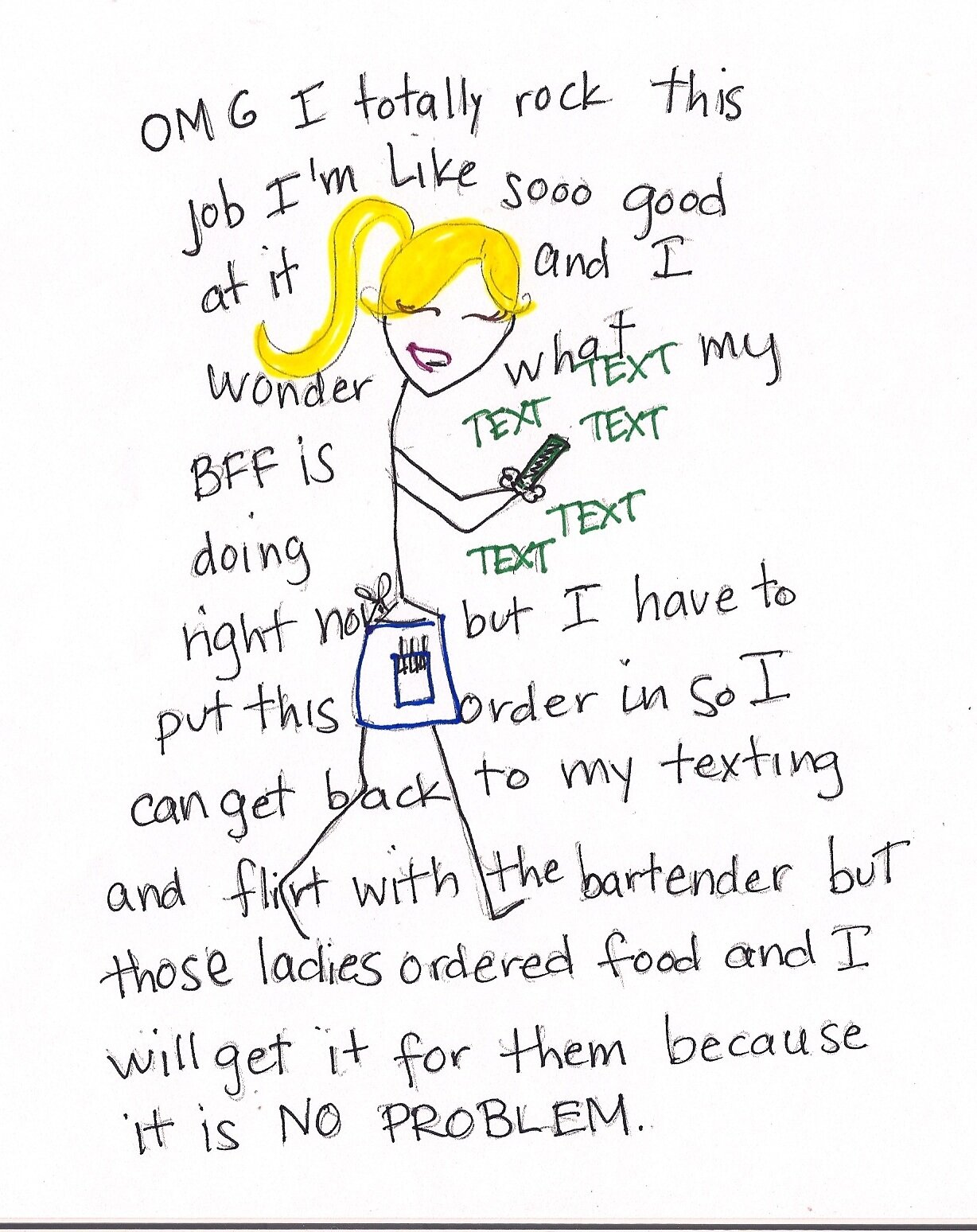Modern Etiquette: No Problem (Restaurant Edition)
I'm going to tell you a little story. One day, not all that long ago, a girlfriend and I went out for lunch at a local eat-and-drinkery. I don't want to name names; I'll call it...the Shmown Shmavern. Jo (name changed to protect...nobody, really, I just feel like being all mysterioso) and I met when we started working together at a restaurant; she and I are both long-standing veterans of the food service wars. We know our way around a table that needs some waiting, or two. I've done it all--bartending, waiting, management, bussing. Chances are good that between the both of us, we've seen nearly everything there is to see in the restaurant biz, and in this particular instance I swear on all that is holy that I am NOT exaggerating.We sat down at a lovely window seat at the Shmavern and...well, OK, there was a little bit of awkwardness, because our first waitress (who passed us off ASAP) is the current girlfriend of my friend's ex-boyfriend. Even though Jo is very happily married and has some adorable kiddos and hasn't been involved with this ex for years, Waitress One decided the best way to handle Jo's presence was to embrace her insecurities, call in a pinch-hitter and avoid our table at all costs.Yay, professionalism. Though I suppose it's better than Waitress One running the risk of not being able to control herself.When the second waitress came over, she dropped off our drinks and took our food orders. The menu at the Shmavern isn't terribly complicated, and we are entirely capable of delivering a food order with little-to-no hassle. The conversation went something like this:
Erm...
Ahhhh...
No problem? Really?
Herein lies my issue: we weren't creating a problem.
In a restaurant, there are a million ways for customers to cause problems (or not), both big and small. Here are some examples:
"Excuse me, this table is noisy and we have some fairly important business to discuss. Can we sit over at that other table that's tucked into a corner, instead?"
No problem. Ding ding ding! Proper use! The customer had a problem, and the server addressed said problem in kind, resolved it and brushed it off as though it was trivial, because after all it's a job structured around customer service. Everyone's happy.
"Hey, I was wondering...I'm allergic to shrimp, would I be able to get this salad with grilled chicken?"
No problem. Once again, the server displays an enviable mastery of the English language. On the grand scheme of things this is a minor problem, really, but nevertheless it requires a little extra legwork on the behalf of the server and can be legitimately considered a "problem". Especially since not managing it correctly could lead to a customer going into anaphylactic shock. Which, I'm sure you will all agree, is a problem.
There is the more tricky, compound request between diner and waitperson:
"Hi. Can I get the mandarin chicken salad?"
"You bet."
"Oh, but...would I be able to get the dressing on the side?"
No problem. See how that works? Had the server replied "No problem" to the first question, then one would have to ask, what could have been the problem, anyway? Were they recently out of chicken? Was the dressing not made yet? Did the chef have an innate fear of mandarin slices and wouldn't make it, but thankfully today there was a mandarin specialist in the back room to help him through the tough part? Instead, she stayed focused on each question as they presented themselves. May I have this? Yes. Can you deviate from the norm at my request? No problem.
"Miss, you don't really mind if my children run around unsupervised and climb up the backs of your booths, do you? Mommy needs some downtime with a pomegranate martini."
Actually...that's kind of a problem.
"Hi....ummmm...I hate to bother you, and I'm not sure how to say this because it's so weird, but I think someone is having sex in the ladies' room."*
o.0
PROBLEM! Big, huge, not-gonna-end-well-for-anyone, someone-needs-to-work-on-their-decision-making-skills type of problem.
*Note: That really happened.
"Hi, I'd like to order my food, straight off the menu, with no special requests. I know exactly what I would like, how I would like it, and I'm ready to answer any question you might have, decisively and cheerfully, in anticipation of a pleasant dining experience."
No problem. BZZZT! Wrong! Thank you for playing. Please try again.
Oh, I'm sorry. Was I interrupting something? I didn't mean to intrude on your busy texting and flirting-with-the-co-workers schedule, but as I have walked into a restaurant for lunch and it is customary that a representative employed by said restaurant should take my order and bring me food in exchange for money and a service tip, I'd really like to get this transaction underway. *sigh* There was nothing special to accommodate when we spoke with our waitress. There were no unusual requests, no climbing children, no allergies, no restroom sexytime. We stated, in a straightforward manner, what we wanted. (See the difference between the request and the statement?) There was just...the expectation that she would do her job as defined by management, in a satisfactory manner.
I can already hear some of you saying, "Oh, come on. That's just a figure of speech, and she was just being nice." I say to you, WRONG! Here is why: because words? Have meanings. "No problem" indicates that by our presence, we've created an issue that the server needs to resolve. Nice way to beat a path to your clientele's heart. The smartasses in the room will in all likelihood point out that I did have a problem; I was hungry and wanted lunch. You say "problem". Restaurants call that "business".
In this sort of instance, the traditional response is quite usually the best one. In response to the table thanking you for taking their (very easy, straightforward, uncomplicated) order, you the waitstaff should say...are you ready for this?...
See? Not that difficult. Same amount of syllables as "No problem" so long as you preserve the contraction. And it passes no judgment on the efficacy or moral weight of the table-waiting transaction. I could go on about how I think this is symptomatic of the rise of the entitlement culture (which I do) or about how management needs to be more fastidious in their coaching (breaking bad habits and all; management, you need to get in there) but here's the thing: that's all lumped under the umbrella of "what I would fix if I were queen of the universe". And as much as anyone, I get that working in a restaurant is a transitional job for a lot of people. I get that you're tired of waiting on people, you're tired, you're hung over, you have a paper to write, your feet hurt, you're fighting with your boyfriend, you're worried because your kid is sick, you're biding your time until you graduate from college, your last table was bitchy through no fault of your own (customers who do this, you know who you are and shame on you), your rent is due, there's a great party going on that you're missing, or you'd simply rather be laying under a palm tree on a white sand beach. I get it. And it's hard, when one of these or a million other things are crowding inside your head and pulling your attention away from the task at hand. But people, please. Manners matter. Think about what you're saying to someone. Think about how you would like to be treated, out to lunch with a girlfriend on a Sunday afternoon. Would you like to feel like you've participated successfully in a business transaction that's been positive for everyone involved? Or would you like to feel that you're, at best, not being viewed as a problem?


